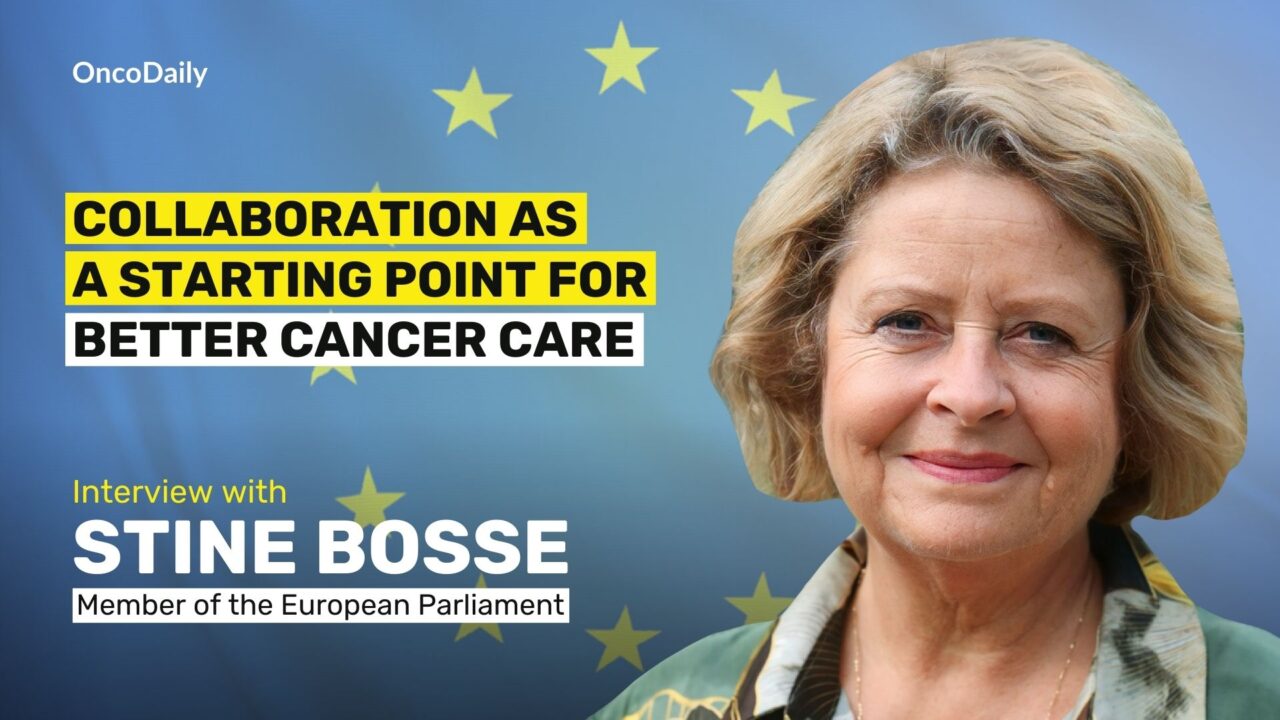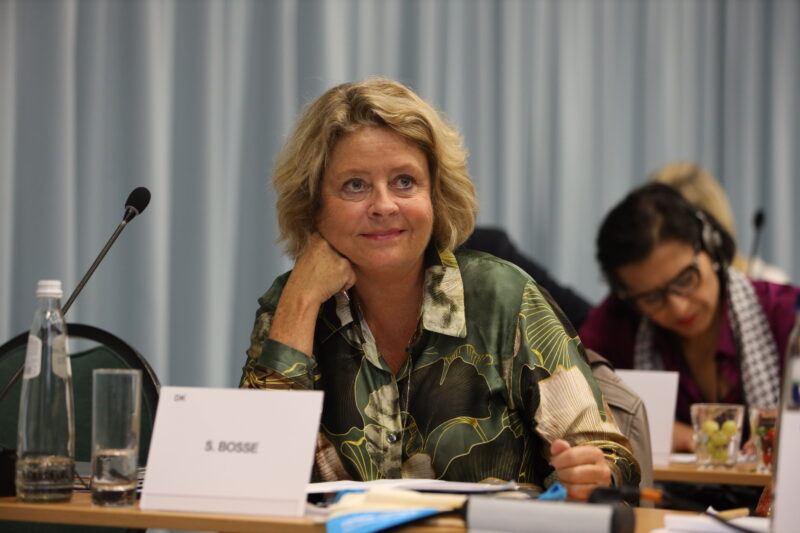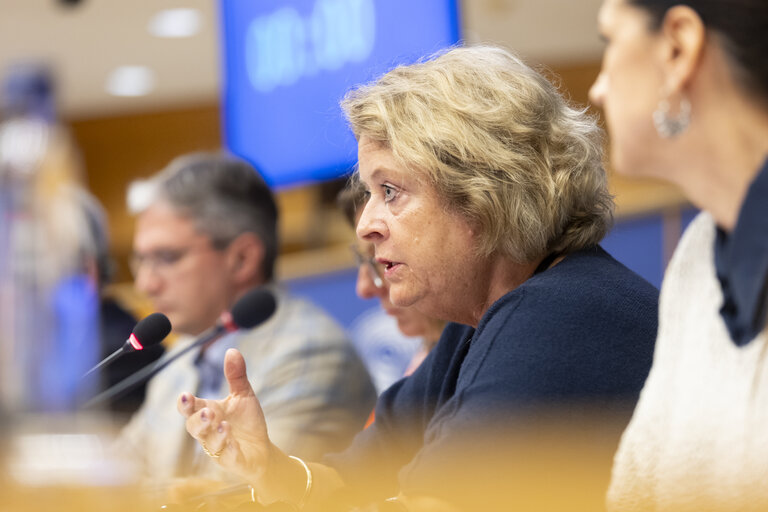
Collaboration as a Starting Point for Better Cancer Care: A Conversation with Stine Bosse
In a world where cancer is one of the leading causes of mortality, the need for equitable access to healthcare is more critical than ever. Stine Bosse, a leader who has carved her path in both the corporate and political realms, offers valuable insights into how Europe can bridge these gaps, including for marginalized groups such as refugees. Drawing from her experiences as a Member of the European Parliament and a former UN advocate for the Millennium Development Goals, Bosse discussed with OncoDaily the pressing challenges and opportunities in cancer care across the European Union.
Business and Healthcare Hand in Hand
Bosse’s extensive background, which straddles corporate leadership and public policy, has shaped her conviction that business and healthcare must work together to achieve a healthier society. “A healthy population is the way forward and goes with healthy businesses. Those two things have to go hand in hand,” she explains. Bosse firmly believes that both sectors must work in tandem to ensure the longevity of European markets, underscoring the importance of national healthcare systems in maintaining the well-being of citizens.
“If you want to have healthy markets where people can enjoy good lives and spend money and do stuff, then you must also make sure that the system in any country works. Otherwise, you’ll have tensions and some of the things that we see occasionally when countries fall apart,” Bosse adds.

Addressing the Gaps in Cancer Care for Marginalized Groups
Cancer care poses significant challenges for marginalized groups, especially refugees, who often face systemic barriers such as language gaps, financial hardship, and lack of documentation. When asked about the pressing healthcare gaps, Bosse stresses that while the responsibility for healthcare remains with individual nations, there is a need for the EU to foster cooperation. “We can actually deliver more and, at the end of the day, also deliver at a better price if we work together.
This is within cancer care, it is within rare diseases, it’s within how we tackle the growing AMR, and the resistance towards penicillin. In these areas, we need to work very, very closely together. So, for me, that’s the starting point, and that is where we have to look for areas where we can do more together. And where any euro spent will come out at a more efficient level,” Bosse says.
She is realistic about the challenges, recognizing that refugee care may not fully align with the standard available to citizens. However, she advocates for greater coordination among EU nations, suggesting that best practices be shared to improve refugee healthcare. “I am not sure this can ever be completely the same. I don’t think so. I think we will have to live with the fact that there will be differences. But of course, we must have an ambition to look after refugees in this sense. But it has to remain as a national obligation,” Bosse states.
Financial Toxicity: A Growing Threat in Cancer Care
Cancer patients face a significant financial burden, which extends beyond the direct costs of treatment to include lost wages, caregiving expenses, and long-term financial instability. Stine Bosse emphasizes the importance of support systems that help these patients return to work, advocating for a societal obligation to assist them. “I do think that there needs to be an obligation that we try and look after cancer patients so that they can enter back into the workforce. And if that is not possible, then of course they have to be looked after by some kind of social welfare,” she says.
She also highlights the role of employers and government in improving working conditions for cancer patients. “In my country, Denmark, we have what is called a ‘flex job,’ where people can return to the workforce with modified hours or different conditions. Here also, the government supports this to some extent,” Bosse explains.
However, Bosse also acknowledges the complexities of life’s challenges, pointing out the limits of what can be remedied. “But I will also argue that you cannot, and this is 63 years of life experience speaking, you cannot take away all burdens. You cannot. We receive different challenges during life, and some of them we can face and handle. Some of it we need to handle together as families, as communities, as welfare systems. And some things just cannot be leveled out,” she adds.
Mental Health Support as a Part of Cancer Treatment
Cancer patients not only battle with the disease itself but also face significant mental health challenges, especially among refugees and underserved populations. Stine Bosse highlights the importance of raising awareness of the mental health challenges among cancer patients and expanding mental health services across the EU to support these vulnerable groups.
“If you are a refugee and you are suffering from cancer and you are also suffering from the mental health situations alongside this, I don’t think you can ever really take that away. But there needs to be an awareness. There needs to be an awareness of what is actually the mental health situation alongside cancer diagnosis,” she begins.

Highlighting the variability in support systems across countries, Bosse sees an opportunity for EU nations to learn from one another. “We can learn from each other cross-border and understand how things are done in different countries. And yes, it should be with an ambition that all EU citizens should be supported in one way or another with some kind of mental health support if they are facing a serious diagnosis like cancer,” she notes.
Bosse concludes with a powerful remark on the human aspect of cancer care, highlighting the complexity of treating the disease while addressing mental health needs. “You are dealing with your cancer in a different way if you get the right healthcare support,” she asserts.
We Can Do So Much More Together
One of the most exciting developments in EU healthcare policy is the growing focus on cross-border collaboration in cancer care. Bosse believes in the potential of international cooperation to address rare cancers and other rare diseases. “We can do so much more together. Because it is so obvious that in smaller countries, but even in larger countries, the number of people affected by the very special kind of cancer or kind of rare disease is so small that the knowledge becomes a problem,” she stresses.
Bosse calls for a comprehensive data-sharing system that can pool resources across Europe, enabling better outcomes for patients with rare diseases. She draws on her personal experience, sharing a story of her daughter’s battle with a rare viral brain infection and the challenges they faced. “This was before COVID, and it was before there was a lot of knowledge in this area. But we couldn’t get any help at all, and this was in Denmark. But then we found out that there were other countries where this was recognized, and we could get help. So, we have to look at this together,” Bosse explains.
Bosse was unequivocal when asked about her message for policymakers, businesses, and cancer advocates: “Collaboration is the key to building a more equitable healthcare system.” She advocates, “Let’s take down some of the borders that we actually create amongst ourselves. Let’s work closer together. Let’s work together without any prejudice. Let’s understand that the way forward is a combination of strong, solid business practices and a demand for access to healthcare for all citizens in Europe,” she concludes.\
In her conversation with OncoDaily, Stine Bosse articulated a vision for the future of cancer care that hinges on enhanced collaboration across Europe and beyond. She emphasizes the need for united action to remove barriers to comprehensive cancer care, arguing that collaboration between countries, businesses, and communities is critical to effectively addressing health inequalities.
By Yeva Margaryan, MD, MPH
Find more post on OncoDaily.
-
Challenging the Status Quo in Colorectal Cancer 2024
December 6-8, 2024
-
ESMO 2024 Congress
September 13-17, 2024
-
ASCO Annual Meeting
May 30 - June 4, 2024
-
Yvonne Award 2024
May 31, 2024
-
OncoThon 2024, Online
Feb. 15, 2024
-
Global Summit on War & Cancer 2023, Online
Dec. 14-16, 2023
